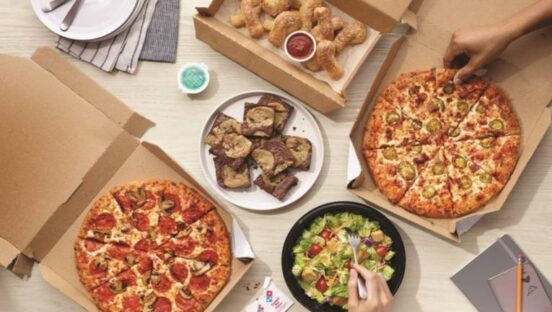Domino’s announced Wednesday a historic deal with Uber Eats and Postmates after years of resisting third-party partnerships in the U.S.
It will start in the fall in four pilot markets, with a national rollout expected by the end of 2023. As part of the agreement, Uber Eats will be the exclusive platform in the U.S. until at least 2024, customers will still be able to use the Domino’s Tracker through the Uber Eats app, orders will be delivered by uniformed Domino’s drivers, and Uber One and Postmates Unlimited members will receive deliveries with no charge.
“Domino’s has a history of successfully entering new marketplaces,” Domino’s CEO Russell Weiner said in a statement. “We are the leader in the delivery and carryout pizza marketplaces in the U.S. In addition, Domino’s sells more food on its digital platform than any pizza company in America. Now that aggregators are at scale, the next logical marketplace for us to enter is order aggregation. Our research in the U.S. and learnings from 13 of our international markets has shown us that taking orders using the Uber Eats Marketplace provides access for Domino’s and its franchisees to a new segment of customers and what we believe will be a meaningful amount of incremental delivery orders once it’s widely available.”
READ MORE: What’s Fueling the Pizza Industry’s Critical Driver Shortage?
It’s a significant turn for Domino’s, which had previously taken a hard stance against third-party delivery companies. In April 2019, then-CEO Ritch Allison told investors, “When I take a look at our U.S. business, I don’t see any need for us to go onto these third-party platforms.” Almost two years later, he kept the same philosophy, saying, “Every time we look at it here in the U.S., it just doesn’t make sense for us or our franchisees economically.”
But recent struggles with delivery pushed Domino’s to explore all options. In the first quarter, the concept’s delivery same-store sales dropped 2.1 percent, rolling over a 10.7 percent decline in 2022. The company blamed the drop on guests opting for dine-in occasions and tightening their wallets. The brand has also had a tough time with hiring delivery drivers, which it’s tried to solve by offering more flexibility (working shorter shifts, fewer hours per week, and signing up for shifts with short lead time) and adding a new fleet of electric vehicles for those that may not have their own car.
Meanwhile, Papa Johns has praised the benefits of third-party aggregators. In May, CEO Rob Lynch said 50–60 percent of the chain’s third-party marketplace business is incremental. The executive also lauded delivery companies’ ability to supplement Papa Johns’ slimmer labor pool during busy times—to the point that it has prevented stores from closing early. Pizza Hut is in the same boat. President David Graves told QSR in May that in early 2022, the brand saw roughly five transactions per store per week through aggregators. By the end of the year, it had increased to nearly 50. He said that it gave Pizza Hut an opportunity to go after incremental customers and new occasions.
Domino’s already has a $1 billion international business with third-party delivery aggregators.
Outside the U.S., markets that currently don’t partner with Uber Eats will start transitioning this year. Master franchisees that are already with Uber Eats outside of the new global contract will be able to move to the new agreement before the end of the year. Domino’s said the deal could potentially allow Uber Eats to provide incremental orders to 70 percent of stores across the world.
“Domino’s and Uber both have a sustained track record of leadership in technology and innovation,” Uber CEO Dara Khosrowshahi said in a statement. “We’re excited to announce this unique partnership with Domino’s globally—both starting as their exclusive third-party marketplace partner in the U.S. and making their menu available to our consumer base around the world—and we look forward to bringing customers the convenience, technology, and experience that are foundational to both of our brands.”
In May, Uber Eats controlled 23 percent of sales in the U.S., according to Bloomberg Second Measure. Postmates had 2 percent. The leader was DoorDash at 65 percent.








